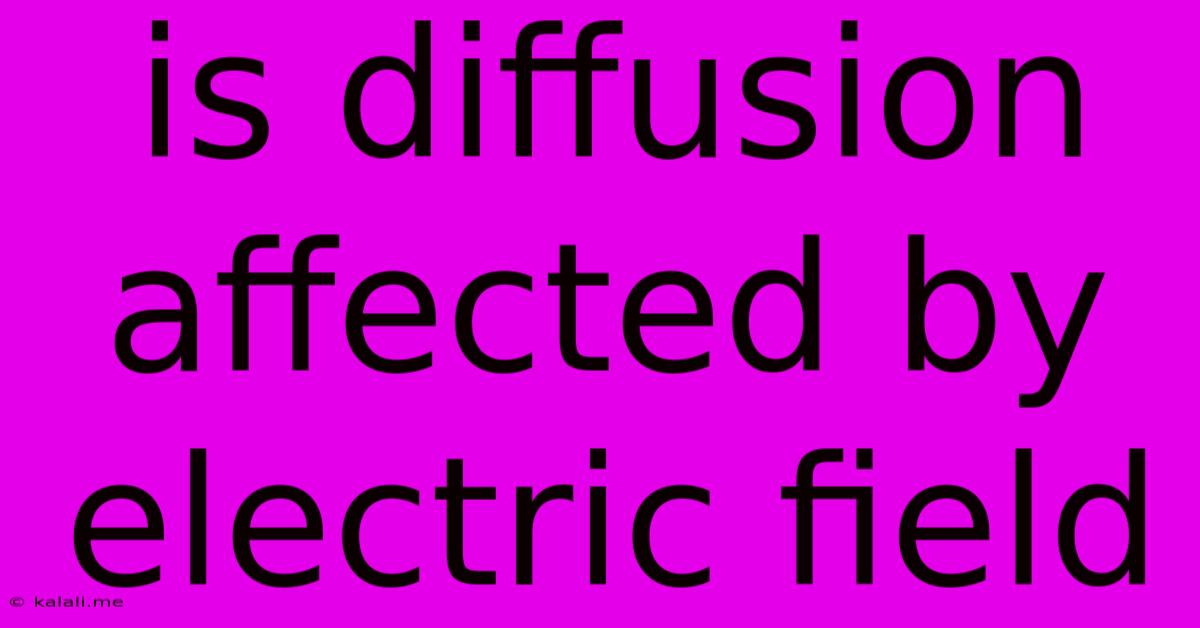Is Diffusion Affected By Electric Field
Kalali
May 24, 2025 · 3 min read

Table of Contents
Is Diffusion Affected by an Electric Field? The Influence of Charge and Mobility
Diffusion, the net movement of particles from a region of higher concentration to a region of lower concentration, is a fundamental process in many areas of science and engineering. But what happens when an electric field is introduced? This article explores the fascinating interplay between diffusion and electric fields, explaining how the presence of a field can significantly modify the diffusion process. The short answer is: yes, diffusion is affected by an electric field, but the extent of the influence depends crucially on the properties of the diffusing particles.
The impact of an electric field on diffusion stems from the interaction between the field and any charged particles involved. Neutral particles, lacking an inherent charge, are largely unaffected by the electric field. Their diffusion will proceed according to Fick's laws, undisturbed by the external field.
However, the story changes significantly for charged particles, such as ions in a solution or electrons in a semiconductor. In the presence of an electric field, these charged particles experience an electrostatic force, which adds to the random thermal motion that drives diffusion. This additional force can either enhance or impede diffusion, depending on the direction of the field relative to the concentration gradient.
Electrophoresis: The Electric Field's Influence on Charged Particles
When an electric field is applied to a solution containing charged particles, a phenomenon known as electrophoresis occurs. The charged particles migrate in response to the electric field, moving towards the electrode with the opposite charge. This electrophoretic migration superimposes itself upon the diffusive motion, leading to a modified overall flux of particles.
The magnitude of this effect is dictated by several factors:
-
Particle charge: The higher the charge of the particle, the stronger the electrophoretic force, and thus the greater the deviation from pure diffusion.
-
Electric field strength: A stronger electric field exerts a larger force, leading to a more pronounced electrophoretic effect.
-
Particle mobility: Mobility quantifies how readily a particle moves in response to an electric field. Highly mobile particles will exhibit a stronger electrophoretic response than less mobile ones.
-
Solvent viscosity: The viscosity of the medium affects the ease with which particles can move. Higher viscosity reduces both diffusion and electrophoretic mobility.
Modified Diffusion Equations: Incorporating Electric Field Effects
To accurately model diffusion in the presence of an electric field, modifications to Fick's first law are necessary. Instead of relying solely on the concentration gradient, the modified equation incorporates the electrophoretic contribution. This leads to a more complex description that accounts for both the diffusive flux and the drift flux due to the electric field. The exact form of the equation depends on the specific system and assumptions made, such as the linearity of the electric field and the uniformity of the medium.
Applications and Further Considerations
The interplay between diffusion and electric fields finds applications in various fields, including:
-
Microfluidics: Electric fields are used to manipulate and control the movement of fluids and particles at the microscale, often combining diffusion with electrophoretic effects.
-
Electrochemistry: Understanding diffusion in the presence of electric fields is crucial for comprehending processes like electrodeposition and electrochemical sensing.
-
Semiconductor physics: Electron and hole diffusion in semiconductors are strongly influenced by electric fields, affecting device performance.
-
Biological systems: Ion transport across cell membranes is influenced by both diffusion and electric fields, playing a vital role in cellular processes.
In conclusion, while diffusion is a fundamentally concentration-driven process, the presence of an electric field significantly alters the movement of charged particles. This interplay between diffusion and electrophoresis is crucial in many scientific and technological applications. The precise impact of the electric field depends on various factors, highlighting the need for a nuanced understanding of this complex interaction.
Latest Posts
Latest Posts
-
How To Get Gas Smell Off Of Your Hands
May 24, 2025
-
How Long Does A Water Heater Take To Heat Up
May 24, 2025
-
Does The Period Go Inside Or Outside Of The Parenthesis
May 24, 2025
-
How Many Gallons Of Water Does A Dishwasher Use
May 24, 2025
-
Can You Bring Electric Shaver On Plane
May 24, 2025
Related Post
Thank you for visiting our website which covers about Is Diffusion Affected By Electric Field . We hope the information provided has been useful to you. Feel free to contact us if you have any questions or need further assistance. See you next time and don't miss to bookmark.